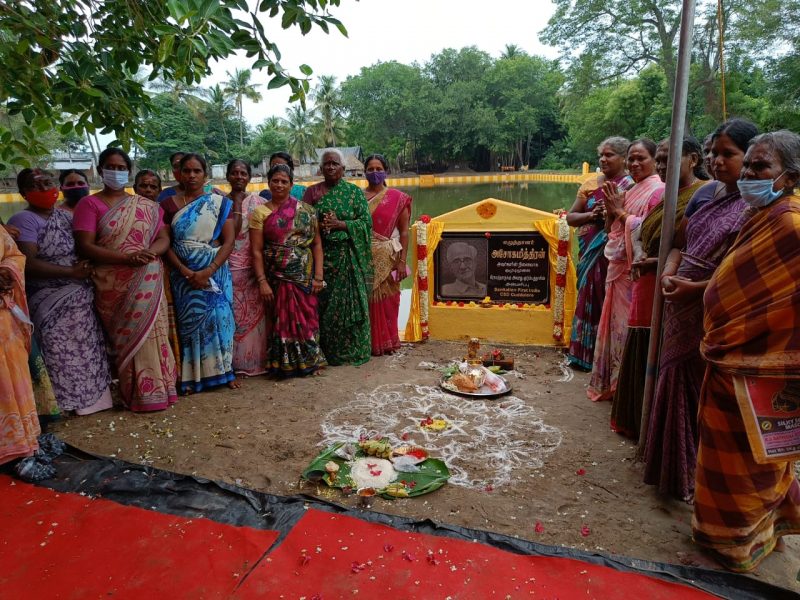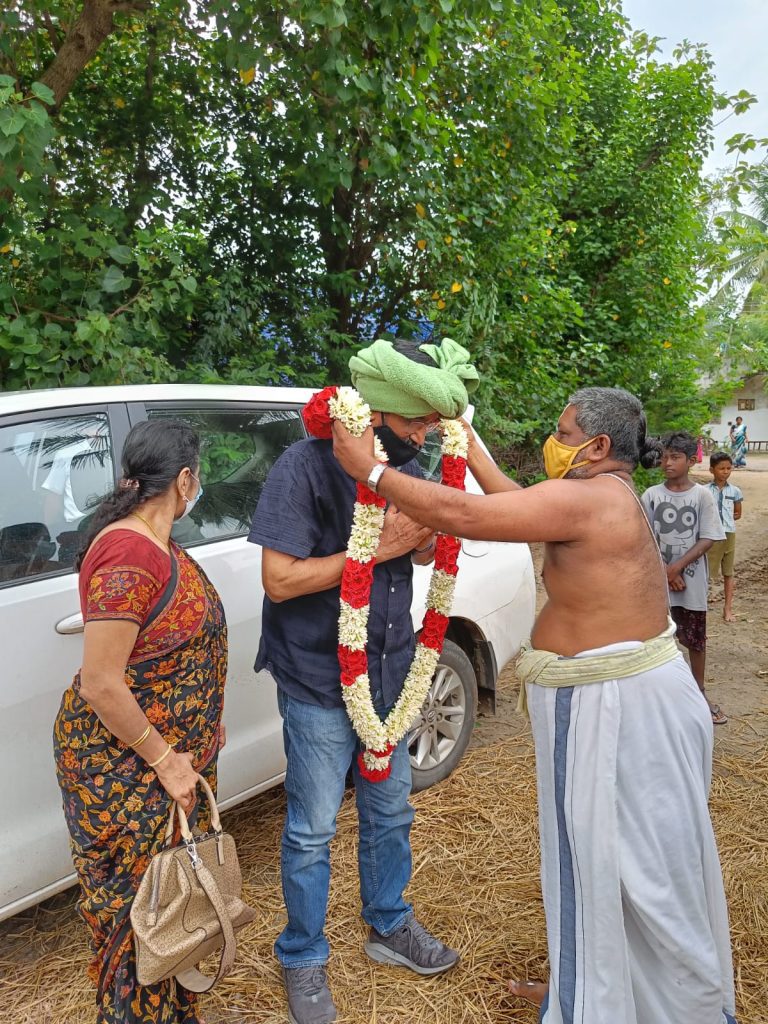
Writer Ashokamitran's son restores water body as tribute to father
Thanneer talks about the chaos of life during the first known water crisis in Madras in the late 1960s

Decades ago, the father wrote a novel based on a severe water crisis in Madras. A couple of weeks ago, his eldest son restored a water body in Cuddalore as a tribute to him.
A constant search for water throughout Ashokamitran’s second novel, Thanneer (Water), not only evoked tremendous response among its readers when it was first published in 1973, but it also influenced the members in the writer’s family.
Thanneer talks about the chaos of life during the first known water crisis in Madras in the late 1960s. Knowing his father’s concern for water, Ashokamitran’s eldest son Ravishankar Thyagarajan recently restored a tank in Cuddalore as a tribute to his father, who would have turned 90 on September 22.
The Pillaiyar Koil Kulam in the Kumudimoolai village in Cuddalore had been lying unused for years. Covered with thick vegetation on its banks, the tank was ‘used’ as a garbage dump as well. Unfortunately, the tank didn’t cover the Tamil Nadu government’s Kodimaramathu scheme, which restores water bodies in the state, due to some technical issues.
Also read: So you thought King Cobra is a single species? Study proves otherwise
It was for sponsoring a toilet for villagers through an NGO called Sanitation First India that Ravishankar had visited Cuddalore. On the way back, the organisers told him about the water bodies lying unused due to lack of maintenance and encroachment in the region. As a child, Ravishankar grew up listening to his father talking about the water problem in Chennai and across Tamil Nadu. So he asked them how much it would cost for the restoration of a tank.
Unfortunately, many tanks and ponds lying unused in the region were more than five and six acres long, which Ravishankar thought he wouldn’t be able to afford. Around this time, an engineer called Arumughom mentioned the Pillaiyar Koil Kulam in the Kumudimoolai village. Even though the total area of the tank was 2.47 acres, its submerged area was only 1.5 acres.
“I wanted to do it on my own, but there were hurdles, one after the other, once we started doing it. There were a lot of formalities and every time the officials found ‘excuses’,” says Ravishankar, a general manager at HDFC, Chennai.

However, Ravishankar went ahead, thanks to his younger brother and senior journalist Ramakrishnan Thyagarajan. “When every effort was leading to desperation and helplessness, he [Ramakrishnan] was the one who got approvals from the collectorate in Cuddalore. Otherwise, the restoration project would not have materialised,” says Ravishankar.
The restoration work began in July 2019 and Phase 1 was completed by November. “First, we thought only desilting will do. But as we entered the project, we found many things to be done. Barring one side of the tank, we had to construct base walls on the other three sides of it. So the cost went up, not as we expected. But I managed to finish the first phase as early as possible,” he says.
Even though things were moving ahead, the pandemic brought a stumbling block to the restoration work. No work was done in 2020 due to lockdown and other restrictions imposed as part of the COVID-19 precautions. In 2021, the second phase began. “It was difficult to remove silt from the tank each time we started the work. Many things we had to do again due to stoppage of work in various stages due to the pandemic and other issues. But we decided to go ahead and finish the project,” says Ravishankar.
Also read: Lokame Tharavadu: Mega art event in Kerala celebrates hope & diversity
Even though Ravishankar spent the money for the restoration work, it was through the NGO Sanitation First India that he could implement the project. “The tank was in a very bad condition with broken steps, a lot of vegetation and garbage around it, inlet and outlet pipes broken. When Ravishankar expressed interest in renovating a water body in memory of his father, we chose this village. We desilted and deepened the tank, constructed steps on the north and eastern side, along with a ramp, rebuilt the wall on all three sides, and repaired the inlet and outlet,” says Padmapriya Baskaran, chief executive of Sanitation First India. The tank can now hold 3.5 million litres of water. This will be recharged by rainwater as well as inflow from a nearby water body.
There is a reason why Ravishankar chose Sanitation First India to help him. “We have been working in that village for many years now. 70 per cent of toilets there are ecosan constructed by us whereby we save over one lakh litres of water every day. The waste is converted into compost, a nutrient rich agricultural input. We have also built a 30,000 litre overhead tank and made toilet blocks in the schools in that village to keep it completely open defecation free and to provide safe drinking water for the villagers. The restoration of the tank was significant in filling up the ecosystem gap,” says Padmapriya.
Ravishankar is happy that he could finish the work on time. “My father would have turned 90 on September 22 if he was alive. I was a bit confused due to the pandemic whether we would be able to finish the work. But things went well. We have also constructed some concrete benches near the tank. After renovation, the tank and its surroundings have become an ideal place for the villagers to sit and relax. It reminds me of my father’s association with the Natesan Park in T Nagar,” he says.
Also read: ‘Wanderer’ poet Vikramadityan wins Vishnupuram Award
Born in 1931 in Secunderabad, Ashokamitran moved to Chennai in 1952 where he worked with S S Vasan’s Gemini Studios for a decade. It was a turning point in his life and the experience there reflected in many of his works.
Ashokamitran, whose real name was Jagadisa Thyagarajan, published eight novels, 15 novellas and more than 200 short stories. Anbin Parisu, Thanneer, Manasarovar, My Years with Boss, Otran, The Ghost of Meenambakkam and Maraindha Nizhalgal are some of his major works. He won the Sahitya Akademi award for his collection of short stories titled Appavin Snegidhar in 1996. He passed away due to age-related illness on 23 March, 2017 in Chennai. With his unique style of satire and irony, Ashokamitran questioned the existing societal prejudices. His works have been translated into many Indian as well as foreign languages.


